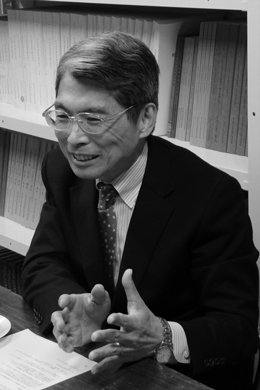Creating Systems to Solve Healthcare Issues
Yasuki Kobayashi / Professor,The University of Tokyo, Graduate School of Medicine

Q: How did you become interested in public health?
Kobayashi: When I began my studies as a medical student, I read various kinds of books, and one of the things that struck me from the reading was that the continuing development of healthcare technology was needed to solve medical problems. Another thing that struck me was that what matters is whether the necessary healthcare technology is being made available to people who are sick or others in need. My feeling was that we were still rather weak as far as both research and systems were concerned. I’ve always enjoyed traveling and during my time as a medical student I traveled all over Japan, thinking about the healthcare situation in remote areas. After graduation I went to Okinawa, where a lot of the smaller islands are quite remote from the main cities. But there, if anything, the systems for delivering healthcare were quite well established. So there again I became aware of how important it is to ensure that the proper frameworks are in place.
Q: You incorporate economic approaches into your research. This must have been quite pioneering for the time.
Kobayashi: From my student days I was interested in how wider systems related to healthcare provision, but the medical department didn’t have any faculty who could teach economics. After four years as an assistant at Teikyo University, I spent a year doing research at Harvard. During that time I audited two classes on public economy at the Harvard Kennedy School of Government. These were extremely useful in helping me to understand economics. After returning to Japan, I started to put what I’d learned into practice using empirical data. Another major problem in Japan at the time was that it was almost impossible to get access to usable data. Now the government has taken the lead in digitizing statements of medical expenses prepared by medical institutions for health insurance purposes and other documentation and is creating a system to make this information available to researchers. There are still plenty of limitations, but the situation is a lot better than it was.
Q:Your specialization is public health, which is translated as “kokyo kenko igaku” in Japanese at the university. But the word “public” can also be translated as “koshu” instead of “kokyo.” Is there any difference in meaning between the two translations?
Kobayashi: “Koshu eisei,” which means public health or hygiene, is extremely important historically as the wording used in the Constitution. But the word “koshu” has a slightly old-fashioned feel to it nowadays. Since it’s the term used in the Constitution, though, that gives it a kind of authority.Public health means quite different things depending on time and place. For example, even today in developing countries health conditions can be improved by installing water and sewage systems and disposing of garbage and refuse properly. But this doesn’t apply to modern Japan. You have to start by addressing the reality. In this, the situation is the same as with clinical medicine. But whereas clinical medicine deals with individual patients, public health is concerned with groups. The situation differs depending on what kind of groups you are dealing with, as well as place and time.

Q:What are some of the issues that students starting a career in public health should be aware of today?
Kobayashi: I think individual preferences are important. If people follow their aptitudes and interests, that will naturally lead to positive results in the future. At the moment, a lot of our students in public health at the University of Tokyo are medical graduates, but that’s not necessarily the case in other countries around the world. In the School of Public Health at Harvard, for example, many students have an economics, engineering, or political science background. Subjects like public policy and public health are interdisciplinary fields, so I think that something like GSDM, which acts as a virtual framework for cross-sectional research across various fields, is very useful as a gateway to that.
Q: What kind of training do you think students of public health will need for the future?
Kobayashi: The field is becoming extremely diverse and complex, so I think for both graduate students and undergraduates it would be a good idea to put a system in place so that students are encouraged as a matter of course to spend a certain amount of time working professionally after completely their studies before returning to research institutions, in order to give them time to charge their batteries. The Department of Public Health at the University of Tokyo does perform that role at least partly. Around 30% to 50% of our students have several years working experience, and some have ten years or more. To make the curriculum more accessible for people like this, we have prepared a course that can be completed in one year, which is already functioning. I think creating more innovative educational frameworks in universities is going to be extremely important in all kinds of spheres in the years to come.
